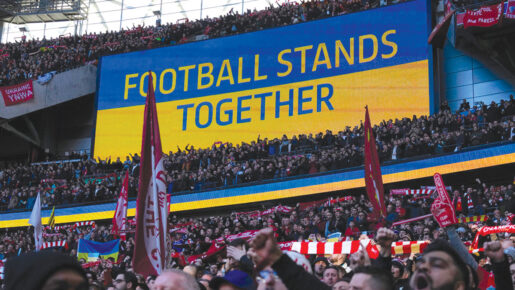The 72nd FIFA Congress in Doha, Qatar:
A Short and Sweet, but Serious Summary
By Danial Golforoush
Football Stands with Ukraine
At the time of writing, just more than one month has passed since the Russian invasion of Ukraine and the world of football has taken a stance against this act. While it would be untrue to say that this is the only ongoing war around the world, the footballing community has not wavered from its position. Within a few days of the initial attacks, football’s governing body, FIFA, released a statement extending rumored and temporary measures: “FIFA and UEFA have today decided together that all Russian teams, whether national representative teams or club teams, shall be suspended from participation in both FIFA and UEFA competitions until further notice.” This statement was then followed up with “temporary employment and registration rules to address several issues in relation to war in Ukraine,” which provided players and coaches of Ukrainian teams and foreign nationals working in Russia the flexibility to temporarily break their contracts and move if necessary. The ban meant that the crucial UEFA Europa League match between Russia’s Spartak Moscow and Germany’s RB Leipzig was canceled and RB Leipzig went directly to the next round of the competition! Teams across the world demonstrated their support for the people of Ukraine in one way or another as well. The captains of Chelsea and Liverpool walked on the pitch with yellow and blue wreaths in hand before their match as the fans around the stadium held signs of support. West Ham United, who had given their Ukrainian star Andriy Yarmolenko time off to tend to his personal needs, wore his number 7 jersey during the warm-ups of their match against Wolves. 
The support from the fans has not faded away in the past month and it is still carrying strong. This was proven once again as there were pleas to “stop conflicts and wars” during the 72nd FIFA Congress in Qatar. The recorded message from Andriy Pavelko, the President of Ukrainian Association of Football, was played with Russian delegates present—setting the tone for the meeting. “We have regularly received sad news of the deaths of members of the Ukrainian football community…They have been killed by the aggressors’ rockets from one of the biggest armies in the world. Football has taken a back seat in our country,” said Pavelko. His remarks were then later addressed by Alexey Sorokin, the Russian delegate at the meeting, who mainly brushed off Pavelko’s comments, saying: “It is difficult for them, we understand that…But I’m here not to discuss politics or military activities or anything, I am here in the FIFA Congress.” Sorokin followed up by questioning the bans against Russia and its teams: “We are not hiding. We have every right to be here… We find it kind of strange that the Russian team was not allowed to play in this qualification…It’s strange. We feel that our football players and football lovers have nothing to do with [the war].”
No immediate decisions or changes were made during the meeting, however, due to the ban in place because of the war. The Russian National Team were disqualified automatically from their qualifying game against Poland, which all in all means that they will be missing out on this year’s World Cup in Qatar. On the other hand, Ukraine can still qualify with their final games postponed to June with the hope that the team will be able to compete for their spot then.
Ukraine will face Scotland in their next match, which the winner will play against Wales. The winner of that match will qualify for the 2022 World Cup and will join England, Iran, and the United States in Group B!
Qatar’s Humanitarian Record Brought Under Question Again
There was no question that the Russian invasion of Ukraine and its effect on football would be a point of discussion, however, it was the passionate speech of the Norwegian Football Federation president that turned some heads. Lise Klaveness, a lawyer and retired footballer, rose to the stage and demanded FIFA step up and uphold its members to the highest of standards.
 She began: “Football can inspire dreams and break down barriers, but as leaders we must do it right, to the highest standards… Last year Norway debated boycotting the World Cup in 2022. Instead, we voted for dialogue and pressure through FIFA as the best way to work for changes. Our members question ethics in sport and demand transparency. FIFA must act as a role model.”
She began: “Football can inspire dreams and break down barriers, but as leaders we must do it right, to the highest standards… Last year Norway debated boycotting the World Cup in 2022. Instead, we voted for dialogue and pressure through FIFA as the best way to work for changes. Our members question ethics in sport and demand transparency. FIFA must act as a role model.”
Klaveness continued: “In 2010 World Cups were awarded by FIFA in unacceptable ways with unacceptable consequences. Human rights, equality, democracy: the core interests of football were not in the starting eleven until many years later. These basic rights were pressured onto the field as substitutes by outside voices. FIFA has addressed these issues but there’s still a long way to go. The migrant workers injured, the families of those that died in the build-up to the World Cup must be cared for. There is no room for employers who do not secure the freedom and safety of World Cup workers. No room for leaders who cannot host the women’s game. No room for hosts that cannot legally guarantee the safety and respect of the LGBTQ+ people coming to this theater of dreams… Initially FIFA hesitated [to sanction Russia but], international pressure forced a reaction.
“FIFA must set the tone and lead,” she ended.
Her remarks were then followed up by Hassan al-Thawadi, the secretary general of the Supreme Committee for Delivery and Legacy, who defended Qatar’s progress and commitment to change in the past 12 years, saying “even our harshest critics such as Amnesty recognise our commitment.” He also pointed out that the World Cup will highlight the region not as a war torn area, but a thriving one at that! He concluded his speech by demonstrating his disappointment with the Norwegian FA’s lack of initiation of direct dialogue with the Qatari SC and perpetuation of stereotypes.
The events that followed were controversial as the FIFA president presented a video that demonstrated the improvements in the life of the workers and the start of dialogue about the safety of the LGBTQ+ fans once the tournament begins.
In hindsight, much of the dialogue, improvement, and guarantees provided by the host nation must have been in place before their selection! FIFA and the greater footballing community ought to take this moment and establish a robust plan and policy for the future.


















